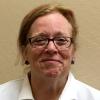Summer in Bullhead City, Arizona, can be grueling. Temperatures (and tempers!) are often above 120 degrees Fahrenheit during the day in this sometimes-drug-plagued town near the intersection of Nevada, California and Arizona on the Colorado River.
As a physician assistant working in psychiatry and emergency medicine and also a Racine Dominican associate, I have grown to love working and living in the Southwest, but summers are a definite test of that love.
I went to Bullhead City on a summer assignment after a very discouraging academic teaching experience. That hot summer day, I was the day provider at the one methadone clinic in town, serving Hispanic farm laborers, students, First Nation people, businesspeople and tattoo artists who came in for their daily doses of methadone. Many of them admitted that the drug gave them their life back, a way to end addictions to other legal and illegal drugs that had imprisoned them in so many ways. Others were trying to hang on as long as they could to this mind- and body-easing elixir.
Many of the patients brought in their partners, wives and children into the clinic, as it was too hot to wait outside, even at 5 a.m., when the clinic opened. That day, Mario brought in his wife, Marisol, and their 5-year-old daughter, Isabella. Mario had recently started on the methadone program, and we talked in the office about what to expect, the limits, risks and benefits of the program. I did a brief physical exam, and Mario was ready for his daily dose of methadone.
The whole time, Marisol and Isabella watched me without expression, silently and intently. Mario explained that their English was quite limited. I asked after Marisol's health in my limited Spanish and asked Isabella if she would like a dulce (a sweet). Her enthusiastic "Si" had me scrounging for a sucker for her in my desk and cool bottles of water for the adults.
After they left around noon, it was time to close the clinic for the day. I remembered that I needed a few things at the grocery store and headed up the street to the local market. While pushing the cart through the aisles, I heard a child scream and turned around just as I heard the pounding of feet heading in my direction. To my infinite surprise, Isabella hurled herself into my arms, crying and telling me that she needed more dulces. I held her and asked why she thought she needed more suckers. She informed me that there were five other children (two other families) at the laborers' cramped quarters where they were staying, and they had no sweets there.
Marisol and Mario hurried over, apologizing profusely. I reassured them, saying that they could be proud of their daughter's thoughtfulness. I was profoundly amazed at the concern for others in this little child, under circumstances most would call dire. So of course, before we left the store, Isabella had a new friend and a small bag of suckers to take home.
The trio came into the clinic many times that summer, never leaving without suckers enough for their house. That was the summer I learned the sacramentality and transformative power of Tootsie Pops.
[Mare Wheeler has been an active Racine (Wisconsin) Dominican associate for the last five years. She is a physician assistant in Arizona.]
